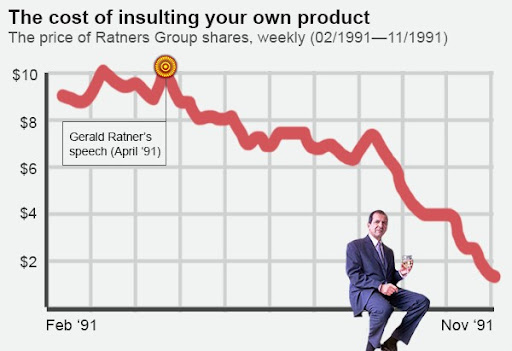Writing Speeches
Speeches & Presentations
A Huge & Growing Market
While you can certainly make a lot of money with the written word, there’s a whole other world of opportunity in the spoken word, too. Speeches and presentations are constantly being delivered to all kinds of audiences.
Most people don’t have the skills or expertise to write their own speeches, so they often turn to professional writers to help them out. This is particularly true when a lot is riding on the outcome. The quality of the script can make a massive difference to a business.
Gerald Ratner of Ratner Group learned this when he decided NOT to hire a speechwriter to prepare an important speech. Instead, he wrote it himself—a terrible mistake. The presentation was so poorly received that he ruined his own company, destroying a billion-dollar fortune in seconds.
Ouch!
On the other hand, Steve Jobs of Apple was a master of delivering stunning presentations that his audiences lapped up. With the help of his speechwriters, he added billions of dollars to the value of his company.
Clearly, then, organizations have compelling reasons to pay good money to speechwriters who get the right results. Better still, there is work available in a whole range of markets, including:
Conferences & Seminars
This is the bread and butter work for speechwriters. Every day, thousands of presenters deliver speeches and presentations at events worldwide.
Businesses use these conferences to promote their products, make contacts in their industry and establish their authority. You may get hired to write:
Product Launches
Many businesses use big events to launch their products. These are important, as they help get new ranges off to a good start in the market.
As a speechwriter, you can help by creating presentations for key executives to deliver. You may have to write speeches for several different people, as well as help with press releases and product literature.
Meetings
While many speeches are delivered at large events, that’s not always the case. Sometimes you may be asked to write a presentation for a small audience.
Often you will be hired because the people in the meeting are important, so your client needs to make a good impression. They may be potential customers or senior executives who expect high standards.
Political & Nonprofit
Opportunities in speechwriting are not limited to the business world. Politicians make a lot of speeches, often with a lot riding on the result. Many of these use expert speechwriters to help them craft a powerful message that has the impact they want.
Leaders at nonprofit organizations, too, often need to make speeches. They may be aiming to:
Online Presentations
In the last few years, online meetings have boomed. Due to recent changes in society, people have become accustomed to working from home and doing business online. The result has been a massive increase in the number of meetings conducted using Zoom or other meeting software.
The stakes are often just as high as in face-to-face meetings and events. So it’s no surprise that you can get paid to write scripts for these events, too.
How Much Can You Make?
A Highly-Paid Profession
As we’ve already seen, speeches and presentations often come with high stakes attached. Plus, you may be working with senior executives who are accustomed to paying high fees to consultants and other professionals. Because of this, speechwriters can often command high fees.
Here’s a guide to the kind of income you can expect:
Salary.com says:
“The median annual Speech Writer salary is $123,712, with a range usually between $101,358-$158,302. However, this can vary widely depending on a variety of factors.”
Speechwriters in the public sector are very well paid, too. In fact, it’s unusual for government jobs to pay so well. One former government speechwriter says:
“I was a speechwriter in the House of Representatives, the Senate, and for seven cabinet secretaries. Keep in mind that a senior federal speechwriter—a GS-15 level employee) is making about $180,000 per year on the federal payroll (Washington, D.C based). Few writers who make that salary in the public sector are going to settle for less once they retire and become a private sector writer.
"If a speechwriter was a presidential writer before retiring, the sky's the limit for that same writer who transitions to a big public relations firm in Washington. There are several such firms in Washington, and they head-hunt very aggressively for the cream of former federal speechwriters. If I had to ballpark a per-speech price for one of their speeches, I’d have to aim somewhere above $5,000.”
When asked how much he earns, corporate speechwriter Ian Griffin said:
“In a good year, $200,000. Most jobs will pay a flat fee, but some pay by the hour. Experienced speechwriters charge between $8-$15,000 for a project and $150-$350 an hour.”
So whichever type of speechwriting you choose to do, it’s clear that there’s good money to be made!
How to Write Great Speeches
Standing Out from the Crowd
Without a doubt, the most exclusive speechwriting job is writing for the President of the United States. Sarah Hurwitz had an amazing career at the White House, writing speeches not only for the Clintons, but also for President Obama and his First Lady.
Here are her tips on how to craft an amazing speech:
Channel The Speaker
The true art of speechwriting isn’t scripting someone—it’s channeling their voice. The first step when writing a speech is to sit down with the speaker and ask , “What would you like to say?”
This conversation provides the information needed to write a first draft. Then the writer and the speaker can work together to improve the speech, draft by draft.
Research and Understand Your Audience
Get to know your audience by asking questions such as:
If Mrs. Obama was speaking at a university, for example, Sarah needed to understand the history and student body of that university. If your speaker is giving a toast at a friend’s wedding, you need to know what kinds of stories may be appropriate.
Know that Structure is Destiny
If you have a bad structure, you can’t have a good speech. Every paragraph should flow logically from one to the next. Sarah says:
“When I’m trying to figure out the structure of a speech, I’ll often print it out and cut it up with scissors so I can move parts around. It’s only then that I realize the order is wrong or I see that I’m repeating myself or I notice that certain passages could be combined.”
Seek Multiple Opinions
It’s important to ask other people to look at your speech. Ask as many as possible, especially if you’re speaking to a community you don’t know well.
You need to find someone from that audience who understands its cultural sensitivities and norms. That way, you will write a speech that inspires people rather than causing offense.
Throw the Rulebook Out of the Window
Writing to be read and writing to be heard are two very different skills. Spoken language doesn’t need to conform to grammar and punctuation norms. Sarah says:
“I often use ellipses instead of commas to indicate pauses because they’re easier to see. It’s fine to space things weirdly on the page or add notations if it helps you—all that matters is how the words sound coming out of the speaker’s mouth.”
With that in mind, you should edit out loud. Don’t just sit looking at your computer screen—print the speech out, practice delivering it, and edit as you go.
Listening is the Key
Sarah remembers:
“There were hundreds of occasions when Mrs. Obama gave me feedback that ultimately influenced how I write. My drafts would be covered in her handwritten edits.”
Be receptive to all feedback from your speaker. If possible, listen to the speaker rehearsing and ask yourself:
Write in the Speaker’s Voice
It’s a mistake to write the same kind of speech for every speaker. An authoritative CEO will have a different style to a Hollywood actress. Make sure you use a tone and phrasing that suit the speaker.
Listen to speeches that the speaker has presented before. This will give you a feel for their cadence and vocabulary. Use these to craft a speech that’s appropriate.
Show, Don’t Tell
This may sound like a basic writing tip, but it’s rare that people execute this well. If you’re bored during a speech, it’s probably because the person is telling not showing.
Mrs. Obama didn’t start her 2016 Democratic National Convention speech by saying: “On my daughter’s first day of school at the White House, I was nervous, afraid, and anxious.”
Instead, she said:
“I will never forget that winter morning as I watched our girls, just 7 and 10 years old, pile into those black SUVs with all those big men with guns. And I saw their little faces pressed up against the window, and the only thing I could think was, ‘What have we done?’”
It’s a searing image. Anytime you find yourself using a lot of adjectives, stop, step back, and think about painting a picture for people instead.
Don’t let Technology Get in the Way
We’re living in the age of Zoom, and many people are delivering speeches virtually, which creates a whole new set of challenges. The audience often has their cameras turned off, or even if they’re on, there’s a disconnect.
For this reason, Sarah advises against a lecture-style format on Zoom. Instead, opt for interview style—give the host a set of questions, so the right message can be conveyed in the answers.
Watch the Clock
People are distracted today and have limited bandwidth to listen to what you are saying, so it’s really important to focus your message. Do you want them to feel:
Whatever the emotion, really think about that as you’re writing the speech. As for the length, it depends on your venue. If you’re doing a toast at a wedding, keep it to five minutes; for a keynote speech, no longer than 20 minutes.
Consider the Format
Some speakers are most comfortable with their speech when it’s written out verbatim. For others, reading a speech word for word feels awkward. Try experimenting with different formats, such as bullet points or cue cards, to find what’s right for each speaker.
You may need to experiment with several formats to get one that works well. The more you know your speaker, the easier it will be to identify the right approach.
Tips & Tactics
Shortcuts to Better Speeches
A clever idea here or there can elevate a mediocre speech into a great one. So here are some ideas for taking your speeches up a notch, so your work truly has impact:
Write Your Speech Outline First
Outline your speech before you begin writing the words. This helps you stay on topic. It also gives you an opportunity to test out the flow of ideas and pacing.
If anything in your outline seems out of place, you have an opportunity at this point to make room for it, or discard it. Don’t hang onto irrelevant parts past the outline stage. If it won’t fit, don’t try to force it.
Write Your Introduction Last
Your introduction is one of the most important parts of your speech. This will set the tone for the entire speech. Sometimes, it’s hard to get past that first step to the meat of the speech because you’re not certain what the speech is about yet.
So skip the intro and start working on the body first. Once you’re done, you will know exactly what your speech is about. That’s the point where you can nail your introduction, touching on a few key points, and getting your audience ready for the main event.
Your introduction is your hook. This is the way you grab attention. Use this moment to engage the audience by deploying strategies such as:
Use Stories In Your Speech
After your outline is done, look for places to add stories. We’ve already discussed the fact that people love stories, and they work particularly well in speeches.
When interviewing your speaker, ask if there are any relevant anecdotes you can include. They will nearly always help to engage your audience more effectively.
Use Repetition
Humans are creatures of habit and routine. Both habits and routine come from the repetition of actions, thoughts, and words. Use that to your advantage when you write your next speech.
Pick a short phrase to repeat throughout your speech. It will trigger a subconscious reaction in your audience and help them pay attention. It will help them remember your points, too.
An example of repetition in a speech is Winston Churchill’s “We shall fight on the beaches; we shall fight on the landing ground” speech. Everyone knows and remembers most of it. It’s the repetition of “we shall fight” that made this speech memorable.
Write A Great Ending
Hey, no pressure, but you need to write an awesome speech ending. This is your chance to recap briefly, excite the audience, and add your call to action.
What did your audience want and need from your speech? What was the point of the entire thing? The ending of your speech is where you show your audience that you delivered exactly what they needed.
Stick To The Facts
It’s easy to get sucked into the drama of passionate topics. When people are excited about something, they tend to exaggerate.
Elaboration is one thing—and it’s a good thing to do in a speech—but it’s a slippery slope from elaboration to exaggeration. Be sure you can cite sources at any given moment.
The Best of Both Worlds
Speechwriting allows you to combine creative skills with a businesslike approach to communications. It’s a challenging field, but one that offers great rewards.
Get good at this and…who knows…maybe a president or prime minister will one day read one of your speeches to the world!
Training Modules
Copyright 2024 - Paid Online Writing Jobs - All Rights Reserved
Copyright 2023 - Paid Online Writing Jobs - All Rights Reserved

















 ?
?

 !
!